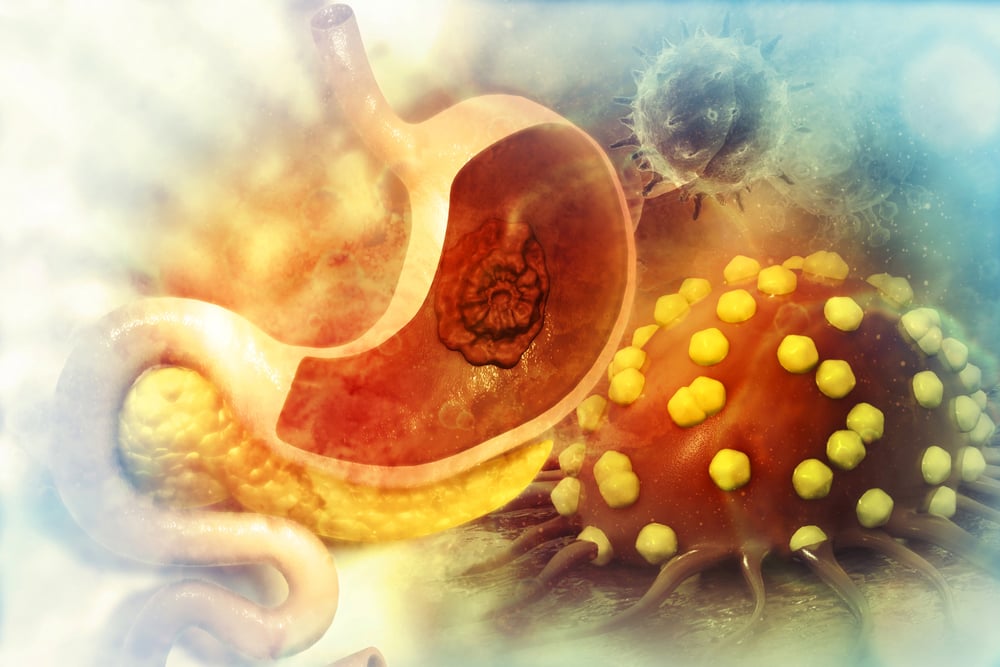Astellas Pharma Inc. has announced positive topline results from its phase 3 SPOTLIGHT clinical trial evaluating the efficacy and safety of zolbetuximab in combination with mFOLFOX6 (a combination regimen that includes oxaliplatin, leucovorin and fluorouracil).
Zolbetuximab is an investigational first-in-class monoclonal antibody targeting Claudin 18.2 (CLDN18.2), for the first-line treatment of patients with CLDN18.2-positive, HER2-negative, locally advanced unresectable or metastatic gastric or gastroesophageal junction (GEJ) adenocarcinoma.
The Astellas’ SPOTLIGHT trial enrolled 566 patients with CLDN18.2-positive, HER2-negative, locally advanced unresectable or metastatic gastric or GEJ adenocarcinoma. The study met its primary endpoint showing statistical significance in progression-free survival (PFS) for patients treated with zolbetuximab plus mFOLFOX6 compared to placebo plus mFOLFOX6.
In addition, the Astellas’ study met a secondary endpoint, overall survival (OS), showing statistical significance for patients treated with zolbetuximab plus mFOLFOX6 compared to placebo plus mFOLFOX6. The most frequent treatment-emergent adverse events (TEAEs) in patients treated with zolbetuximab plus mFOLFOX6 were nausea, vomiting, and decreased appetite. Detailed results will be presented at a future scientific congress and submitted for publication.
Limited options
“I am excited by the potential for a new treatment option to help patients with advanced-stage gastric cancer or GEJ cancer,” said Kohei Shitara, primary investigator for the SPOTLIGHT trial and chief, Department of Gastrointestinal Oncology, the National Cancer Center Hospital East in Kashiwa, Japan.
“Gastric and GEJ cancers still have very limited treatment options available for patients with an advanced diagnosis.”
“We’re delighted and excited about the positive topline results from the SPOTLIGHT trial of zolbetuximab in combination with mFOLFOX6, and we have increased confidence in advancing development of zolbetuximab for the first-line treatment of patients with locally advanced or metastatic gastric cancer,” said Ahsan Arozullah, senior vice president and head of development therapeutic areas, Astellas.
“These topline results further support the role of CLDN18.2 as an emerging biomarker in gastric and GEJ cancer. We look forward to presenting the full results at a scientific congress in the near future.”
Mode of action
Zolbetuximab acts by binding to CLDN18.2 on the cancer cell surface of gastric epithelial cells. In pre-clinical studies, this binding interaction then induces cancer cell death by activating two distinct immune system pathways — antibody-dependent cellular toxicity and complement-dependent cytotoxicity.
CLDN18.2 is a type of transmembrane protein found in normal gastric cells and is a major component of epithelial and endothelial tight junctions controlling the flow of molecules between cells. Pre-clinical studies have shown that CLDN18.2, which can also be present in gastric tumors, may become more exposed and accessible to targeted therapies with antibodies as gastric tumors develop.
Based on this study, approximately 38% of screened patients have CLDN18.2-positive tumors, defined as CLDN18.2 expression in 75% or more of tumor cells with strong-to-moderate staining intensity based on a validated immunohistochemistry assay.
Gastric cancer
Gastric cancer is often diagnosed in the advanced or metastatic stage, or once it has spread from the tumor’s origin to other body tissues or organs. The five-year relative survival rate for patients at the metastatic stage is approximately 6%.
Gastric cancer, also commonly known as stomach cancer, is the fifth most commonly diagnosed cancer worldwide. Signs and symptoms can include indigestion or heartburn; pain or discomfort in the abdomen; nausea and vomiting; diarrhea or constipation; bloating of the stomach after meals; and loss of appetite and sensation of food getting stuck in the throat while eating.
Risk factors associated with gastric cancer can include older age, male gender, family history, H. pylori infection, smoking and gastroesophageal reflux disease (GERD). Because early-stage gastric cancer symptoms frequently overlap with more common stomach-related conditions, gastric cancer is often diagnosed in the advanced or metastatic stage, or once it has spread from the tumor’s origin to other body tissues or organs.
Gastroesophageal junction (GEJ) adenocarcinoma is a cancer that starts at the area where the esophagus joins the stomach.





